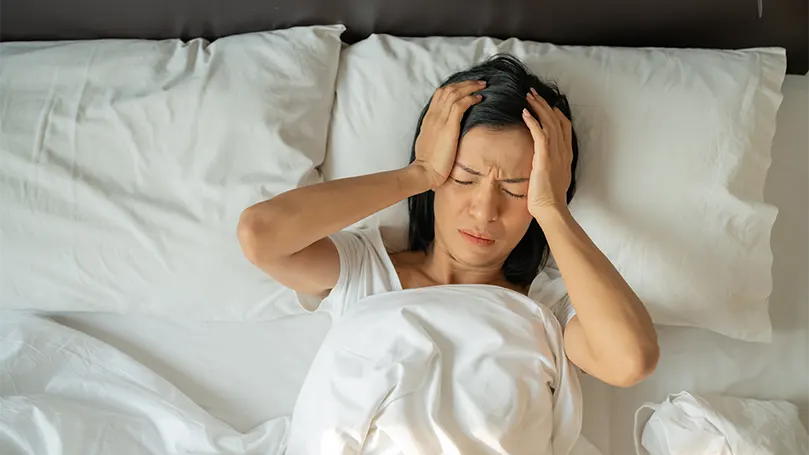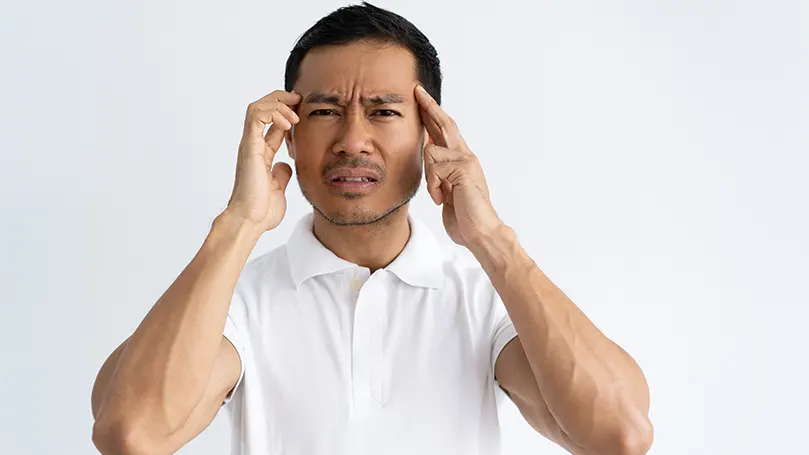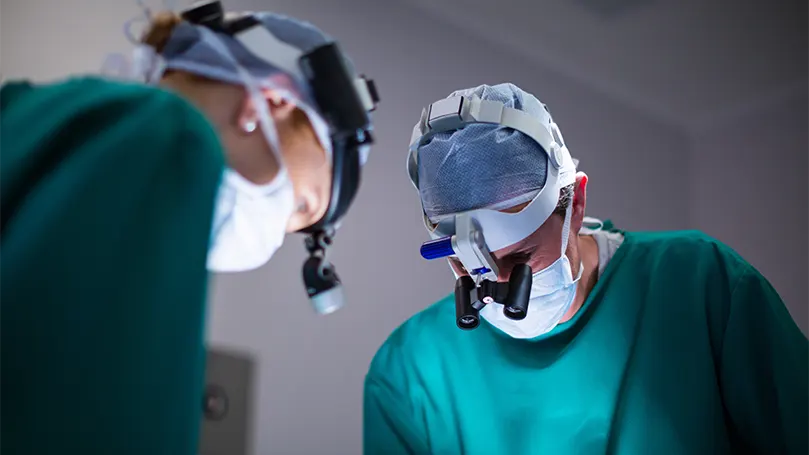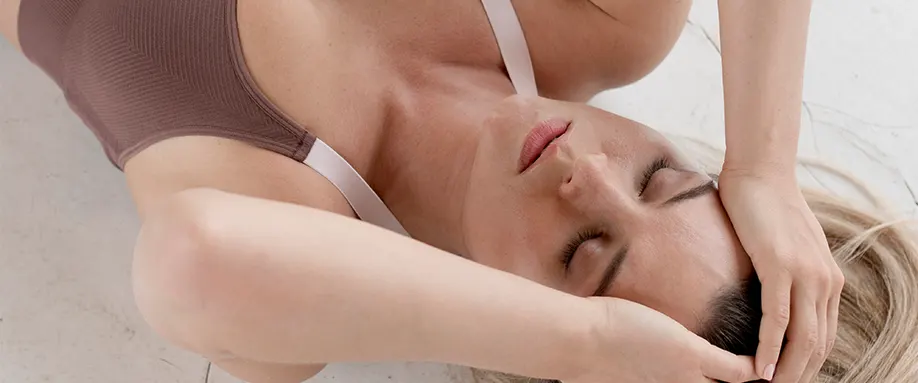Benign Paroxysmal Positional Vertigo

Benign Paroxysmal Positional Vertigo (BPPV) is a problem in the inner ear that is caused by loose calcium crystals called otoconia. These crystals can flow freely in the fluid-filled spaces of the inner ear, including the semicircular canals (SCC) that sense the rotation of the head.
Otoconia will occasionally drift into one of the SCCs, usually, the posterior SCC given its orientation relative to gravity at the lowest part of the inner ear. That's the case especially if your preferred sleeping position is on the side.
But also, when someone's head changes position, such as looking up or down, going from lying to seated or lying to seated in bed, or when rolling over in bed, the otoconia move to the lowest part of the canal and stimulate the balance (eighth cranial) nerve. This can cause vertigo and jumping eyes (nystagmus).
BPPV can affect people of all ages but is most common in people over the age of 60. Most patients can be effectively treated with physical therapy. Rarely, the symptoms can last for years.
If you think you might have BPPV, talk to your doctor or physical therapist. They will likely perform the Dix-Hallpike test. It involves moving your head into specific positions to see if it causes a bout of vertigo. If you are diagnosed with BPPV, there are several treatments that can help relieve your symptoms.
But, let's stop being technical for a minute, and let's discuss the vertigo symptoms you might experience if this issue's bothering you.
What are the symptoms of BPPV?
Now that we've explained what the BBPV is, let's take a look at how and why you can experience vertigo even when you're lying still.
Dizziness
Dizziness, a feeling of unsteadiness or wooziness, can be a symptom of BPPV. That is because the condition causes the false sense that you or your surroundings are spinning or moving. This can lead to feelings of weakness and even fainting.
Vertigo

Vertigo attack is the most common symptom of BPPV.
It is the feeling of being dizzy, off-balance. It's a common condition that can be caused by many things other than BPPV, including inner ear problems, migraines, and even anxiety.
While vertigo can be scary, it is not life-threatening and there are treatments available for vertigo sufferers.
Headache

BPPV can cause severe headaches in some people. This is because the disorder can cause the inner ear to become inflamed, leading to a severe headache.
Switching the head position can help you ease the headache by alleviating the pressure off your head. This can be done by lying down, tilting your head to one side, or using a pillow to support your head.
Nausea

Nausea is a common symptom of BPPV. Just like with headaches, this is because the disorder can cause the inner or even middle ear to become inflamed, leading to nausea and vomiting which could disrupt proper sleep.
However, considering how many other conditions can cause nausea, this symptom is rarely “the smoking gun” when it comes to diagnosing BPPV. So, keep this in mind and don't self-diagnose! Rather, go to a professional and leave that to them.
The main causes of BPPV
Now that we've explored the symptoms of BPPV, let's take a look at the possible causes.
Head injuries

A head injury, both mild and severe, can cause BPPV due to the damage it causes to the inner ear. Whether it causes it or makes vertigo worse, a head injury could be a reason you're experiencing a vertigo episode during the night.
Another thing to realise is that a head injury could cause an array of other sleep issues, including sleep apnea.
Aging
Aging is arguably the most important risk factor for developing BPPV.
People over the age of 60 are much more likely to develop this condition than younger people. There are a number of factors that may contribute to this increased risk, including changes in the structure and function of the inner ear as we age.
Inner ear problems
While there can be a variety of causes for sudden episodes of dizziness and vertigo and sleep deprivation, one possibility that is often overlooked is an inner ear infection.
Inner ear infections, also known as labyrinthitis, can cause inflammation in the nerves around the inner ear, leading to vertigo and other symptoms closely associated with BPPV.
How to treat vertigo while sleeping?
More often than not, vertigo will disappear on its own. As you know, our bodies are capable of healing on their own, so there's a good chance you won't need any treatment.
On the other hand, if it doesn't go away on its own, there is more than one way to treat vertigo while sleeping, and some of them don't even include medications.
But, instead of just listing them, let's take a closer look at some of these treatment options.
Medications for motion sickness

While it is true that it is not common practice to administer medication for vertigo, a doctor could prescribe medication for a patient if the individual experiences extreme nausea or vomiting.
In such cases, anti-nausea medications would be given in order to help the person tolerate repositioning manoeuvres (which we'll talk about in just a second).
Technique & exercises explained by the doctor
Doctors could teach you some exercises and give you some sleeping tips on how to beat persistent vertigo.
One of the ways to treat vertigo is Vestibular rehabilitation. This technique helps to retrain your brain and improve your balance. You'd often train with an experienced physician that will help you gain a better understanding of these techniques.
Additionally, you could rely on canalith repositioning manoeuvres – a series of exercises that involve head movements can help to reduce the symptoms of vertigo and improve your overall balance. Your doctor can explain the proper way to do these exercises and can offer guidance on how often you should do them.
Two of the most popular manoeuvres are Epley manoeuvre and Half Somersault manoeuvre.
Surgery

While it is not common, surgery could be the only way to treat vertigo while sleeping.
Surgery is the only option in the event that there is a tumour putting pressure on the vestibular or cochlear nerves, causing imbalance, as well as some other issues.
In these cases, the procedure is typically necessary even outside the vertigo. After all, these types of issues can cause other issues further down the line. So, it's best to consult with your GP and see whether a surgery is necessary.
Inner ear inspection

While not exactly a treatment, your physician could perform an inner ear inspection in order to find out if there's anything wrong with your ear canal or eardrum that could be causing your BPPV symptoms.
After all, our inner ear allows us to keep balance. So, severe vertigo while sleeping could potentially indicate some type of obstruction or issue with your inner ear. If so, the treatment might differ from BPPV, so, it could be worth your time to have your inner ear checked out first.
Conclusion
In conclusion, BPPV is a very common disorder that can cause dizziness and vertigo. Nine times out of ten, it is not a cause for concern – no matter how uncomfortable it may be.
While it is not uncommon for the condition to go away on its own with time, there are steps you can take to treat this issue before it becomes worse or chronic. If none of these aforementioned treatment options works for you after some time, consult with your doctor about how you can move forward with treatment. And if you've ever experienced vertigo while sleeping, feel free to share your experience in the comments!















There are no comments yet
"*" indicates required fields